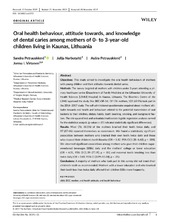| dc.contributor.author | Petrauskienė, Sandra | |
| dc.contributor.author | Narbutaitė, Julija | |
| dc.contributor.author | Petrauskienė, Aušra | |
| dc.contributor.author | Virtanen, Jorma | |
| dc.date.accessioned | 2020-04-22T10:26:41Z | |
| dc.date.available | 2020-04-22T10:26:41Z | |
| dc.date.issued | 2019-12-13 | |
| dc.identifier.issn | 2057-4347 | |
| dc.identifier.uri | https://hdl.handle.net/1956/21967 | |
| dc.description.abstract | Objectives This study aimed to investigate the oral health behaviours of mothers with young children and their attitudes towards dental caries. Methods The survey targeted all mothers with children under 3 years attending a primary healthcare centre (Department of Family Medicine at the Lithuanian University of Health Sciences [LSMU] Hospital) in Kaunas, Lithuania. The Bioethics Centre of the LSMU approved the study (No. BEC‐OF‐14). Of 176 mothers, 123 (69.9%) took part in the 2016–2017 study. The self‐administered questionnaire enquired about mothers' attitudes towards oral health and behaviours related to the potential transmission of oral bacteria to their children, dietary habits, tooth brushing, smoking, and background factors. The chi‐squared test and univariate/multivariate logistic regression analyses served for the statistical analysis. (p values ≤ .05 indicated statistically significant differences). Results Most (76; 68.5%) of the mothers brushed their teeth twice daily, and 97 (87.4%) reported themselves as nonsmokers. We found a statistically significant association between mothers who brushed their own teeth twice daily and those who cleaned their children's teeth likewise (OR = 5.42, 95% CI [1.28–6.63]; p = .005). We observed significant associations among mothers who gave their children sugar‐sweetened beverages (SSBs) daily and the mothers' college or lower education (OR = 6.51, 95% CI [1.59–27.19]; p = .01) and maternal tooth brushing less than twice daily (OR = 3.88, 95% CI [0.99–15.18]; p = .05). Conclusions A majority of mothers who took part in this survey did not brush their children's teeth as recommended. Mothers with a lower education and who brushed their teeth less than twice daily offered their children SSBs more frequently. | en_US |
| dc.language.iso | eng | eng |
| dc.publisher | Wiley | eng |
| dc.rights | Attribution CC BY | eng |
| dc.rights.uri | http://creativecommons.org/licenses/by/4.0/ | eng |
| dc.title | Oral health behaviour, attitude towards, and knowledge of dental caries among mothers of 0- to 3-year-old children living in Kaunas, Lithuania | en_US |
| dc.type | Peer reviewed | |
| dc.type | Journal article | |
| dc.date.updated | 2020-01-15T09:15:32Z | |
| dc.description.version | publishedVersion | en_US |
| dc.rights.holder | Copyright 2019. The Authors. | |
| dc.identifier.doi | https://doi.org/10.1002/cre2.272 | |
| dc.identifier.cristin | 1773412 | |
| dc.source.journal | Clinical and Experimental Dental Research | |
| dc.source.pagenumber | 215-224 | |
| dc.identifier.citation | Clinical and Experimental Dental Research. 2020;6 (2):215-224 | |
| dc.source.volume | 6 | |
| dc.source.issue | 2 | |

